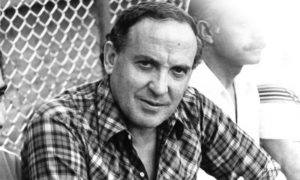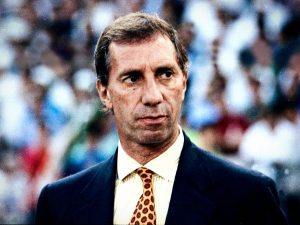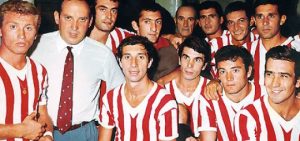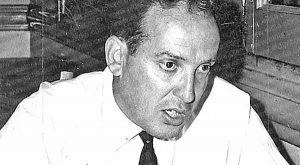Osvaldo Zubeldia – The Forgotten Pioneer Of Philosophy
In the little city of La Plata, the capital of Buenos Aires province of Argentina, the people have a habit of involving football in everything. From their daily household chores to everyday office work, the beautiful game has a hold on everyone’s hearts like nothing else. On the street, in the parks, around corners of houses can be seen children in a kickabout. While for the older generation, it takes place in heated discussions over mugs of brew on cold winter mornings.
Amongst their many views about the beautiful game, one name continues to resurface time and time again. Being Argentines, it is not hard to guess their innate passion for the game. Fighting over the Angels with Dirty Faces to what could have been had Alfredo Di Stefano never left the country, their ideas remain divided until one name. Estudiantes. The local team. And for these people of this city, Maradona is not their Almighty. For them, it’s a man who has not been anything less than God, if not more. And his tale, one of exhilaration, drama and everything that makes for a good soap opera today.
It was a random day in 1982. Medellin, Colombia. Like everyone’s daily fetish, this man went down to the race tracks. Gambling had always been an addiction problem he had not quite dealt with. Things took an unsavory turn in a very unforeseen way, much like the man himself.
His life was poetic in its end but mystical in its conception. A sudden heart attack, and the world had lost one of its gems in the most dramatic way as he had chosen to lead his entire life to that day. He had become somewhat of a demigod figure, tasting the sciences of good and evil in order to improve both the beautiful game. A visionary, a man beyond his age. This is the story of a man lost in the dunes of time. Osvaldo Zubeldia.
1965 was a year of uncertainties. After an underwhelming playing career, Zubeldia had kickstarted his managerial career with Atlanta, from 1961-63. Not particularly fashioned in the country, expectations were not high. In the absence of pressure, Zubeldia led his first club to respectable finishes in the league. A prompt call-up to the national team a couple of years later, and a staggering fall.
With Argentina barely qualifying for the finals, there was need of stability and Zubeldia’s more risky approach did not offer it. A fallout with the country’s FA led to the sack. What followed still remains a gold mine for the country to draw pride for. In the fall of 65, Osvaldo Zubeldia was appointed as the manager of Estudiantes.
In a time when the scene in Argentine football was ruled by the heavenly duo of River Plate and Boca Juniors, there was very little room for any other club to even make a mark, let alone challenging for the title. However, the tiny club from La Plata with a scanty budget but undeterred spirit in its squad, Estudiantes had acquired a nickname ‘la tersera que mata’ or ‘the killer juveniles’.
Despite spending most of their time hovering near the bottom of the table each season, they had grown a reputation of causing upsets from time to time. With a similar season target of avoiding relegation, was hired Osvaldo Zubeldia in 1965. Almost overnight, he changed the face of the game.
Philosophy, is a word that is thrown around quite a lot these days. We don’t see a manager without his or her own approach towards the game. Some apply a more attacking style while others, a more defensive. Some bank on the skills of the players, while others on their physicality. In today’s football world, it is unthinkable that a team lacks a good researcher who studies his opponent. Many owe Mario Gotze’s 2014 World Cup Final winner to research done by German team analysts prior to beginning of extra time. And in history as well we have seen some of the greatest tacticians of all time.
Two of the great minds of the 20th century is often considered to be Rinus Michels for his innovation of Total Football and Helenio Herrera for Catenaccio, two styles on opposing polarities. While Herrera’s Grande Inter ruled the roost in the 60s with Catenaccio, Michels and Johan Cruyff took the world by storm with their Total Football that had basically put Catenaccio to the sword. Amidst these novelties was lost the exploits of Zubeldia. The man who was the first proponent of varying philosophies to beat varying styles. Zubeldia had beaten both Herrera and Michel’s endgame.
Speaking to the media in 1970, once Rinus Michels was quizzed about his ideas behind Total Football, to which he’d replied, “You ask me about Total Football, that was invented by Osvaldo Zubeldia over at Estudiantes six years ago.” With utmost mutual respect, did this compliment come while being a strange reference to Zubeldia’s most famous tactic on the pitch. The evil twin of Total Football, which Zubeldia was often accused of employing, anti-futbol. Was born a negative more physical approach to the game for minnows to overpower bigger opponents on a regular basis.
Much maligned at that time, this style of football went on to revolutionize the game in the later years. While in South America, the Zubeldian school of football has become a culture, many gloried managers of the more recent years owe their success stories to Zubeldia. From Carlos Bilardo to Diego Simeone to Alejandro Sabella and many more rever the great Argentine of the years before. Having played under Zubeldia at Estudiantes, Bilardo had credited the ’86 World Cup triumph to him.
So, what made this man, such an influential figure in the days gone by? When he had arrived at La Plata, nobody had any realistic expectations or aspirations about the team. The same mentality hung heavy when he had first set foot in Medellin, at the helm of Atletico Nacional. Known from his teams’ future foils on the pitch, it was easy to determine the man’s personality. A hard-no-nonsense task master, he took the balmy relaxed temperament of playing in these places by the throat and revolutionized them overnight.
“I revolutionized Colombian football because I ended the siestas,” said the Argentine in an interview back in 1980, two years before his death. “I ended the big breakfasts and the extended lunches. They have to be on the pitch. They have to work day and night.”
The days of leisure and rollick were over. Zubeldia established a strict regime for his players, which they had to stick to no matter what, much like what Sir Alex Ferguson had done when he had first arrived at the Theatre of Dreams. Zubeldia’s arrival to La Plata ushered in the greatest years in the history of Estudiantes.
A team that used to hover near the bottom, was transformed into world beaters in two years, entering the haloed Big Five of Argentina. With some financially heavy foreign imports, Zubeldia had promised to turn Estudiantes into serious title challengers. He was a man of his word. The so called “Golden Era” of the club began in 1967 with them winning their first ever National Championship, qualifying for next season’s Copa Libertadores.
We talk of dream runs and fairy tales. In the recent years we have seen the unprecedented triumphs of Leicester City in the Premier League, Monaco in the Ligue 1, RB Leipzig’s inspiring run for the title and many more. Yet, the first propagators of the idea that a small club can go on to challenge the very best in the continent remains Estudiantes and the brilliant mind of the mad scientist, Zubeldia.
Winning the Copa Libertadores, the next year, Estudiantes qualified for the much-glorified Intercontinental Cup. And they faced the mighty Manchester United. What followed is what makes the club one of the richest historically endowed teams of all time.
In the inner cathedrals of Old Trafford is an artifact. In one of the corners of the Red Devils’ history lies a little board with notes that Zubeldia wrote, where he would have all the main talking points that he wanted to send across to his team. On the board there was a quote that stood out: “You don’t achieve glory by walking through a rosy path.” That quote was his rallying cry to his team as they were about to embark on a series of matches that saw them reach glory as well as infamy. That phrase embodied the ethos of his team.
Needless to say, a master strategist as he stifled over tactics, he deployed one of the first uses of one of the most critically used tactics of today. The offside trap. Fully knowing, it would be impossible to overpower Matt Busby’s United at full stretch, he resorted to different tactics. With his main defender practically, man marking Bobby Charlton out of the game, he relied on physicality against the enigmatic George Best. Time and time again, these two talismans would be caught offside. Best was brutalized, practically nullifying his impact in the game. The result was a 1-1 at Old Trafford and an unlikely but much savored 1-0 victory at home. Estudiantes had etched themselves in history.
Not only a great manager, Zubeldia was a brilliant mentor to his players. A great motivator, tales are recounted about some of his acts that are fondly remembered to this day by those who had played under him. One of them recounts one particular rallying cry that still rings true, “Play every match as if it was your debut. Fans will always forgive one bad play, but they will never forgive that you don’t give your all on the pitch”.
He was a master communicator and his messages were often extremely poignant. There were several reports from that era that Zubeldia, when the squad was having some problems in buying the philosophy he was looking to implement, had them come one day to practice at 4 o’clock in the morning. Instead of training, he loaded the team onto a bus and took them to the local train station. When they arrived an hour later, Zubeldia told them to just sit and observe the people who were on their way to work. “I did this so you can see how fortunate you are, because you are paid to what you love to do most, play football.”
In a time when Colombian football was largely influenced mafiosos and drug lords, Zubeldia directly challenged ignominy’s claim to the throne. With his ideas and visions, eventually changed the entire scenario of the game in the country. The structure became competitive, the players had to fight much more every last point, Zubeldia converted football from a mere pastime to a matter of utmost passion, for which the people were convinced to give their all, as his Atletico Nacional side went on to clinch the title in 1976 and 1981.
At the time, the Colombian league was one of the longest and most gruelling tournaments in the world where the regular season and playoffs would end up being nearly 60 rounds. Zubeldia brought a style and an organisation to Colombian football unseen before, and his disciples marked future generations.
To this day, his sayings about his tactics remain gospels for future generations. Talking about his extensive use of the offside trap, he said, “I believe in the offside because it crushes the opponent morally; the forward that ends up in offside five times ends up being afraid of going into the area”. Imagine a relatively smaller team not employing this tactic when facing bigger opponents, today. Zubeldia also remains one of the first managers to pay close attention to the use of set pieces to his advantage. Through him, the world witnessed the lethality of free kicks and corners.
A friend philosopher guide. While being revered on one side, Zubeldia was maligned for his tactics more often than not. Yet, he remains one of football’s greatest villains, philosophers, heroes, visionaries all packed into one. And above all, a man, eras ahead of his time.
Colombian journalist Hector Montoya recalled the fateful moment from 1982 in an article he wrote as an homage to the great Argentine coach on the 30th anniversary of his death. At the time, Montoya was an 11-year-old kid going to the local store and the shop owner informed him of Zubeldia’s passing moments before. For him, it seemed like bad joke, until he saw people surrounding radio transistors around the neighbourhood hearing the same story.
Tears streamed from people’s eyes regardless of what colours flowed through their veins. Whether they were green – those that root for Nacional – or red – those that support Independiente – or even those that were called sandías – watermelons, referring to those that were green on the outside but red on the inside – everyone felt a tremendous sadness on that day. What made it even more surreal was that he had led Nacional to the league title just three weeks before.
Zubeldia, an awkward Argentine who came with a mystique of greatness and the look of an ageing Italian mobster, enamoured Colombian fans and divided hearts in Argentina. He was the cool old man who would talk incessantly about football to people who knew him. And he left behind, a kaleidoscope of experiments and innovations. A canvas of unending possibilities, he dabbled with, for future generations to exploit. A legacy unparalleled to this day.





Awesome read!
My beloved Estudiantes played his first Libertadores cup for being runner-up in 1966 (not for having been champion in 1967). Anyway, this is an excellent article. Thank you very much for the tribute to our hero
Excellent article, in homage to a great visionary of soccer, but they were wrong in a part in the decade of the 70’s Colombian football did not have the influence of drug trafficking.
Excellent article..!! Zubeldía,, Bilardo, Simeone and Sabella (the four of them mentioned in the note) were -in different moments- managers of Estudiantes, and the four of them lead our team to be Champion.
Let me clarify that Mr. Lombardo is wrong when he says that Estudiantes played the 1968 Libertadores Cup for being runner-up in 1966.
It was for being runner-up in the 1967 National Championship, finally won by Independiente.